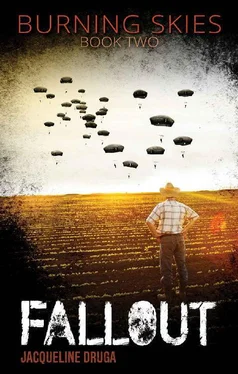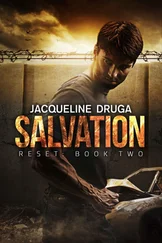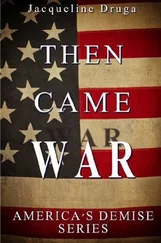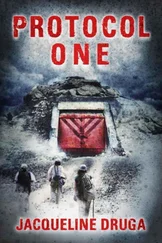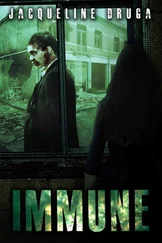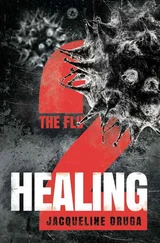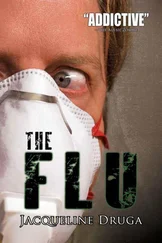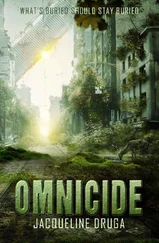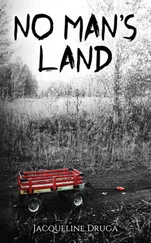Jacqueline Druga
FALLOUT
BURNING SKIES
BOOK 2
To my daughter Veronica, for all the nights you had to sit and listen to me work out this story and for all your feedback, I dedicate this book to you.
Harris Clemmons watched the world end on a ten-inch monitor screen from the second subbasement floor of Kobak, Stewart, and Lane Securities. It wasn’t hard to miss. He was watching for it. People running, an abundance of interference on his screens, a distant flash, then nothing.
Now he sat in a room built for such an event.
Twenty-four hours had passed.
Harris was alone. He didn’t need to be. That was something he grappled with.
He had worked security there and had done so for six years. He usually worked the second shift; he preferred it. Harris wasn’t a morning person and liked to stay up late and binge watch old television shows. The second shift worked perfectly for him.
It was a pretty cool job. Easy, too.
Most days were spent swiveling back and forth in his chair while watching the wall of monitors that spanned the office building and exterior doors.
Camera A2 was a wide-angled street view. How many times did he have to pull footage for the police because of a theft or accident?
That same camera was his window to the apocalypse. Or rather, he assumed it was the apocalypse. He didn’t know, and he wasn’t about to go outside and find out.
Harris had heard the news about New York about two hours before he headed in for his shift. Figuring he could watch the news at work, he went in. He was certain though to bring what he called his ‘shift survival supplies.’ Items such as snacks, beverages, a second lunch, and extra vape juice for his electronic cigarette, just in case things heated up and his shift relief didn’t show. That had happened before. He wasn’t going to take a chance of sitting there, starving, wanting badly to break into the silver supply cabinet. He made the mistake of touching that once and was written up. The one and only time he got into trouble in his six years working there.
Mr. Kobak kept valuable items in that basement in a room off the security area. Mr. Kobak was also one of those big survivalists. He’d even purchased a fifty-thousand-dollar space in one of those luxury bunkers. He planned as well for his security people. In the silver cabinet were rations, water, and other supplies for three people for ten days.
Harris couldn’t recall the last time there were three people on shift.
There was also a binder with tips and guidelines for practical survival.
During the days that would come he would memorize that book, saving the other activities for later.
It seemed more like a holiday than a workday; the office was empty. Harris received a phone call from Mr. Lane stating that he wouldn’t blame him if he left.
Left? Why? Why would he leave? Plus, his relief never showed up and so Harris rolled into the graveyard shift which was quite interesting on a Friday night.
The securities building was a block from the cultural district. An Irish Tavern was across the street and people often parked near his building to walk to the nightlife.
That was his source of entertainment. Watching the people do the drunken strut. He was amazed at how much what was happening in New York didn’t faze them.
Those same Friday night dwellers were his best indicator something was happening.
In an instant, folks went from casually walking to running and panicked.
Harris turned on the news and they were naming cities. Cities that were hit or targeted by nuclear weapons.
He didn’t hear Cleveland, so he felt safe. The people outside weren’t so confident. Cars crashed outside and ten minutes before everything powered down, somehow, people were pounding on the door. How did they know about it? Were they workers in the building?
Optimistic for the best but preparing for the worst, Harris placed the locks on manual before he had no choice.
There were six people in the hall, all of them shouting, pounding.
“You’re killing us!”
“Let us in!”
“Open the damn door.”
Harris shook his head. He wasn’t killing them. If the bombs came, they were the ones that were killing them. Even then, they were three stories below ground. Anything other than a direct hit, they were fine. Steel door keeping them in a room or not.
Harris wasn’t letting them in. He didn’t know them, and he only had rations for ten days for three people. Alone, he could make that last a long time. But alone, he’d go insane. Even though insanity wasn’t very likely, Harris was consumed with guilt. He was a God-fearing Christian man, and it wasn’t very Christian to let those people wait outside in a hall without any provisions.
When he last checked, four of the six remained. He didn’t know where they went or why they’d even leave to go topside to the mayhem and danger.
When Harris opened the door, there were only two people left. A man and a woman. He didn’t say anything to them, he just allowed them into the room, then closed and locked the door.
White Sulphur Springs, West Virginia
When Madeline Tanner was a little girl, she had a vintage Barbie Doll Airplane. It was given to her by an aunt who got it from somewhere else. It wasn’t plastic or sturdy, more so vinyl and flexible. When closed it looked neat and just like a case. When opened it was supposed to be the interior of a plane. It had a flight attendant kitchen and a seating area. The problem was, it wasn’t functioning like the later airplanes. The kitchen cabinet doors were just piece soft vinyl that opened, exposing a picture.
It was the ‘idea’ of a plane that made it fun for her, not that she could even lift it up and pretend to fly. It was a relic of its time.
Much like the Greenbrier Mountain Bunker.
On the outside it was interesting and pretty but, on the inside, what was there wasn’t altogether real or functioning.
Perhaps at one time, the bunker was state of the art.
It was partly nestled under a five-star resort and went deep under the mountain, originally designed to be the hub for congress in the event of an attack on the United States. Up to one thousand people. However, as the years progressed, and the cold war ended, the usefulness of the bunker was lessened and what was once a premier place of survival was transformed into a mockery of a time gone by, and the bunker was made into a museum.
In fact, the entire first floor was redesigned to be a casino. The other areas were roped off and made into displays. The yearly rotating of food supplies ceased.
The bunker wasn’t feasible.
The soldiers had then restored it to its original purpose, and the work had started long before the attacks on American soil.
It was a safe place. Now serving as the nation’s capital, the White House, and the Pentagon.
Just as Greenbrier had transformed, so did Madeline. She had gone from speaker of the house to president in less than two days.
Everything that had occurred in the previous twenty-four hours was a blur. She saw many faces, heard many names, none of which she recalled very clearly. She wasn’t in the mindset to be the leader and make decisions. Not yet. She was still trying to understand what all had happened and sort out the abundance of grief she was dealing with. Grief for her friends, her family, and her country.
Her aide, Lillian, went from being helpful to being useless. Madeline understood, the shock wore off and Lilian kept repeating, “I just want to go home.”
They had adjoining rooms, however the door just didn’t seem thick enough for Madeline to block out the sobs that carried to her from Lillian, so she threw on some clothing and made her way to the main floor of the bunker.
Читать дальше
